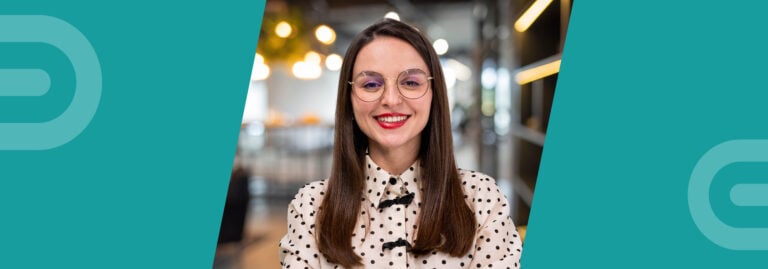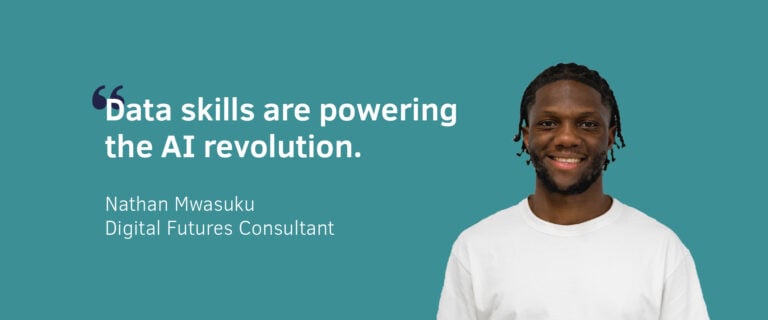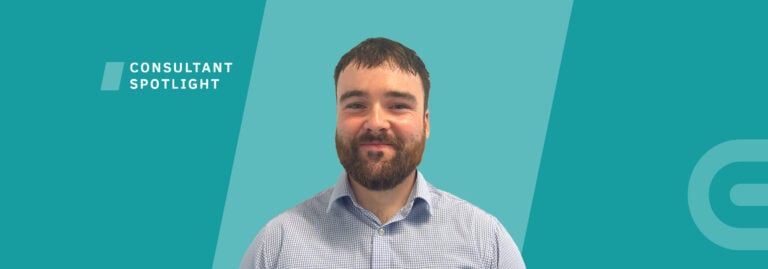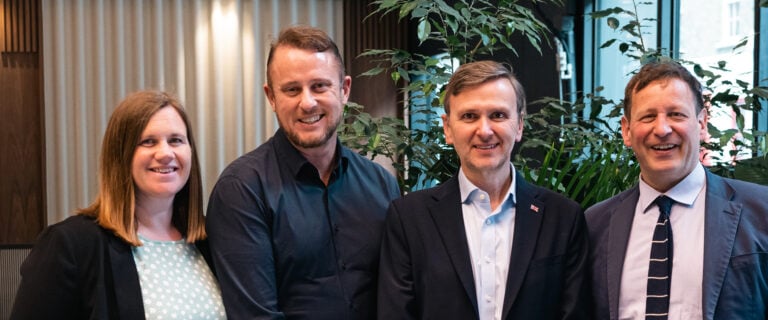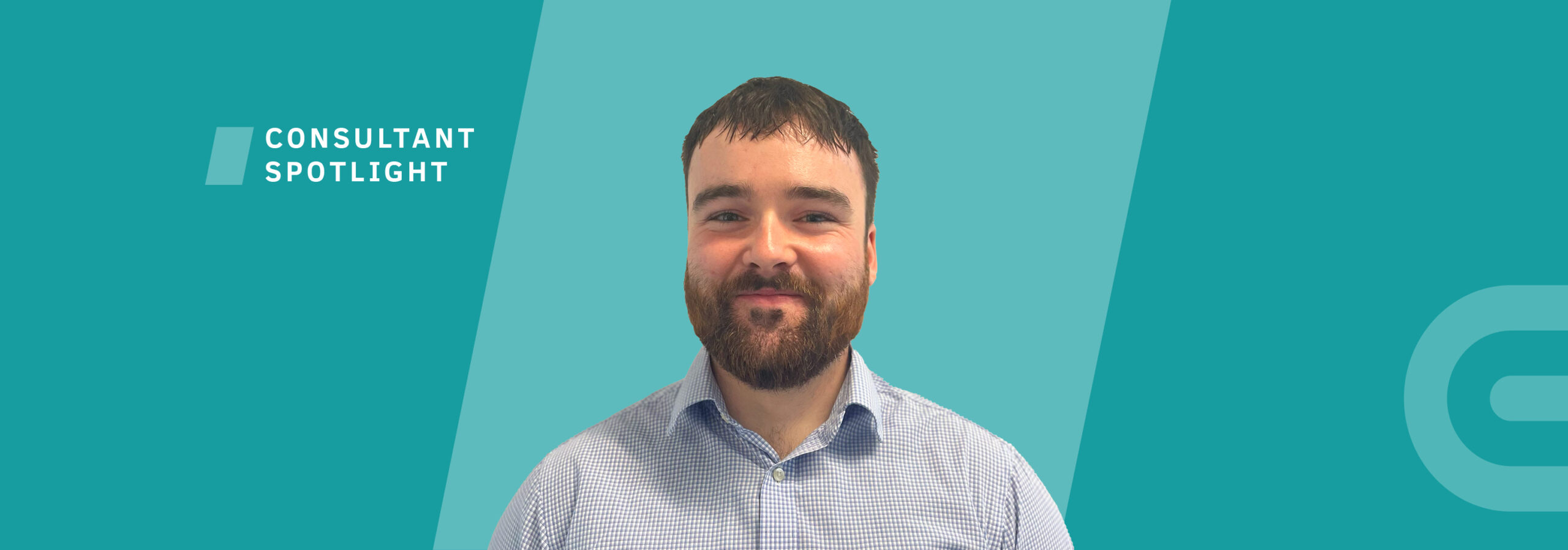
We sat down with Harry Murphy, who after choosing to not finish his degree to take part in the Digital Futures Future Talent Programme, was deployed as a Circuit Provisioner at Europe’s largest investment bank at their new technology services hub in Stevenage.
I moved back to the UK having lived in the United States and started a degree in Environmental Science. I learned quickly from my degree that I enjoyed the maths and data aspects, but I came to realise that I’d maybe chosen the wrong degree subject. This was really emphasised when I went to do a placement year and worked alongside some data scientists and data analysts. They were working on some really cool machine learning models that would do things like track mangrove deforestation. It was loosely related to my degree but nothing to do with what I was actually studying so I came out of my placement quite disenchanted with my degree and I started to try and develop my skills in Python.
"Before I found Digital Futures, I thought getting a job in data was going to be a five-year process, but I’ve ended up where I wanted to be in less than a year."
Harry Murphy, Digital Futures Consultant
I did some Udemy courses and looked around for some career opportunities. I was convinced from talking to people in the data industry that there was no way I was going to be able to break into data analysis or data science on my degree track. My plan was to start building a diverse and enticing portfolio in my spare time whilst working a “filler” job. At that point, that was what I was committed to doing until I went on to my university careers website one day and typed in “data”. Digital Futures was the first thing came up. My instant reaction was – “this looks cool”. I applied straight away. Before I found Digital Futures, I thought getting a job in data was going to be a five-year process, but I’ve ended up where I wanted to be in less than a year.
I hadn’t come across another opportunity like this where you could receive all this training and be on track to get a career at the end of it. The mission of Digital Futures also really stood out to me because my Mum is a woman in tech, and she’s been a huge advocate to get a lot more women in STEM. She brought me up to care about that, so the mission really spoke to me. There is such a need, especially with more AI, for diversity in terms of who is building datasets, models and technology for every day use. When I read through the Digital Futures values, I thought my Mum would be really proud that I’d be working for a company that was aligned in this way and that has these opportunities to diversify the tech industry.
Applying to Digital Futures was very easy. The tests felt pretty entry level and why they existed really made sense to me. I heard back from the team really quickly; I wasn’t left waiting like with other opportunities and that was a really nice feeling. It just made me really excited for the road ahead. I was elated when I got the offer letter, and I haven’t looked back since. The Digital Futures onboarding process put me at ease massively and the speed was incredible. I chose to drop out of my degree to join Digital Futures because I was so confident in the opportunity, and I was made to feel so comfortable by the rest of the team. Choosing not to complete my final year of university could be considered risky but I knew what I wanted to do, and I knew that Digital Futures was the place to do it. I’m so glad that I made that choice.
"I chose to drop out of my degree to join Digital Futures because I was so confident in the opportunity, and I was made to feel so comfortable by the rest of the team."
Harry Murphy, Digital Futures Consultant
The training itself was great – it’s incredibly engaging. Even when you’re struggling, you feel completely supported. In previous studies, I’d always found it hard to voice the challenges I was having but the team at Digital Futures never failed to take calls with me and gave me so many extra resources. It completely reframed how I think about schooling. Digital Futures provides a positive training environment where you’re always given feedback which not only helps you to improve but also to accelerate how you pick things up.
I also made some genuine friendships – everyone is in the same boat and bringing different skillsets and ideas. It was the first time I’d had an experience where everyone was in it for the same reasons and where everyone was interested in and excited by the same things. I’ve made friends for life for sure.
I was deployed with one of Digital Futures clients at one of Europe’s largest investment banks. I’m currently working as a Circuit Provisioner – in my team, we’re responsible for choosing different network infrastructure. It involves choosing things like MPLS and DIA circuits – basically making sure that our network infrastructure is where it needs to be and that we’re not wasting money on old circuits. The role isn’t specifically focused on data analysis, but the fundamentals I learned at the Academy have come in really handy. Things like familiarity with Python has meant that I can automate a lot of the searches that I do – it’s helped me look through our records and find comparisons or to identify where we have been spending money on circuits we don’t use anymore. The direct impact of that is it saves the company money by being able to cancel things we don’t use. The training gave me the ability to know that I can take action pretty early on and I hit the ground running.
Alongside several other Digital Futures consultants, I’m working in the client’s Stevenage office. As I’m starting my career in tech, being in this environment is very novel to me and most people here share that same sentiment but it’s very, very positive. Everyone is ready to collaborate – the office is open plan so if someone has a question, they can just walk two desks over and we can get things done. It’s a really great place to learn because you can pick up so much from just talking to people in different teams about what they do. People here work quickly; they do their jobs and they do them well.
"Everyone is ready to collaborate here – the office is open plan so if someone has a question, they can just walk two desks over and we can get things done."
Harry Murphy, Digital Futures Consultant
Outside of our day-to-day work, everyone here is also really open to socialising, and I’ve been made to feel really welcome, through the different events that are run, like a Chinese New Year party, the football club or the badminton club in Stevenage. Everyone lives nearby and the surrounding area is really nice, so we’ll often head to Hitchin which is only 5 minutes away by train.
I’m incredibly proud to be part of Digital Futures, because of what the company is trying to do and the opportunities that they’ve given me. I never would have dreamed that there would be something like this programme for me. In terms of support I have received, it’s hard to describe because of the level of professionalism and how everyone seems to genuinely care about the success of the people in the Academy. I always felt like I could ask the team a question and I’d always get a response. It’s a small team that’s working towards the same goal and everyone’s really got their skin in the game and genuinely cares about the success of the people. It feels nice because you can trust the team to act in your best interests. Overall, the experience and support I have received has been exemplary; I’ve never experienced anything like it.
Not on our email list? Sign up here to get the latest Digital Futures news, updates and tips.
Find our FAQs for careers in tech here.
Read more about our Data Engineering pathway.
Read more about our Data Analytics pathway.
Read more about our Digital Transformation pathway.
